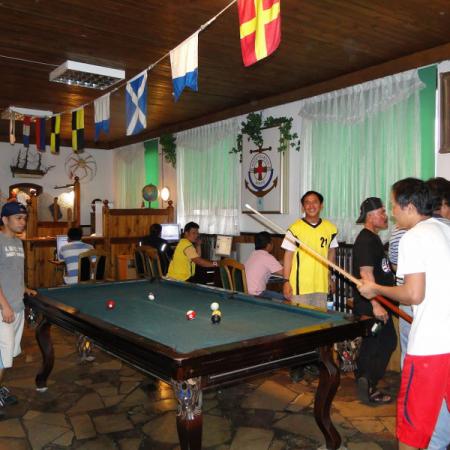Pontifical Council for the Pastoral Care
of Migrants and Itinerant People
Message for the
AOS Regional European Meeting
(22nd - 25th September 2011, Port-de-Buc)
Dear chaplains, volunteers and AOS members,
Through Fr. Bruno Ciceri, who is in charge of the Apostleship of the Sea International within the Pontifical Council, I send you my warm greetings and request your understanding for my inability to be present among you.
In the next few days you will have the opportunity to pray, listen, reflect and share the problems of the People of the Sea within Europe, in preparation for the XXIII AOS World Congress, which will be held in Rome from 19thto 23rdNovember 2012. I hope you will participate in great number in this great moment of our apostolate to reflect on the challenges of the new evangelization in the maritime ministry, 90 years after the letter of Pius XI approving the First Constitution of AOS and his wishing that this Apostolate “...will grow on the shore of the two hemispheres”.
Fishers
We know that fishers in Europe might not suffer as much as their counterpart in developing countries. However they encounter a lot of problems especially with the diminishing fish stock, the increased cost of fuel and the quotas imposed by the European Community.Everyone should think about the future together with a new sense of the universal common good, and the Church should contribute to the formation of consciences. The “AOS Manual for Chaplains and Pastoral Agents” reminds us of the important role that AOS play in ensuring this resource for future generations and in protecting, defending and improving the lives of the communities depending on fishing for their livelihood: “They are rarely, if ever, consulted concerning policies, regulations or decisions that will affect their conditions of life and livelihood: being voiceless, they often rely on Church Organisations and friendly NGOs to make their voice heard.” (Part VII).
It is crucial also that the latest ILO Work on Fishing Convention (188), a very good instrument for the protection of fishers, be ratified and implemented. The Apostleship of the Sea in every country needs to carry out a task of advocacy in lobbying at political and social level, in cooperation with other NGO’s, so that the Convention be ratified and has the force of law as soon as possible.
Cruise ministry
We are all aware that Cruise Ship is the fastest developing sector of the maritime industry and we have only to consult the figures available to realise that it constitutes a huge challenge to our apostolate. This Pontifical Council appreciates the efforts which are being done by your Region to coordinate the ministry on cruise ship, while respecting the way every National AOS deals with the cruise companies and organizes its presence on board of these ships.
The role of the priest on board of a cruise ship is to be witness of Christ at all times, administering the sacraments to Catholic crew and by being open and respectful to the great variety of cultures, traditions and religions present on board. Certainly, ministry on a cruise ship differs from the one in a parish and the priest must familiarize himself, through preparation and training,with the specific pastoral concerns that will accompany him on his voyage.
Piracy
Nowadays one of the greatest problems, among many others, facing the maritime industry and especially the seafarers, is the growing phenomenon of piracy, which has become a real threat to shipping between Europe and Asia. At present around 400 seafarers of different nationalities are in the hands of pirates in Somalia. Most of them are there for several months already and it seems that their ordeal and that of their families is far from conclusion.
Seafarers, fishers and their families are paying the highest price in terms of psychological trauma and other consequences. Before, during and after their ordeal, very little professional assistance is offered to these people who are left unaided to deal with their stressful conditions. It is necessary, therefore, that the Apostleship of the Sea be in contact with them providing spiritual, psychological and, when necessary, also material support.
Besides lobbying the governments and owners for more preventive measures to protect the seafarers, excluding private guards or arms on board, AOS should also be in the front line to develop, in cooperation with other NGO’s, guidelines for practical intervention in assisting the seafarers and their families before, during and after the hijacking.
Best practices
With its variety and models of maritime apostolate, both in form of structure and concrete actions, Europe has a lot of valuable experience. It is important that you reflect on all these practices trying to identify which one is the most successful and, with all the necessary consideration, try to duplicate them in others places within the Region.
Cooperation
In this regard, you have a key role to play. Europe can count on a good network of cooperation and solidarity, with fraternal relations and good lines of communication with all of you. A new field in which your Region can become a model also for other AOS Regions, is the development of a system of exchanging personnel for formation on the practical level (managing centers, ship visiting, etc.), and also for the learning of the English language in order to give to the volunteers of English speaking countries the possibility to communicate with the seafarers.
The strength of AOS is in its network, and no one should have to work in isolation without the benefit of mutual support and encouragement.
In conclusion, I express my gratitude to all those who have organized this meeting, especially Fr. Edward Pracz, the Regional Coordinator, and the local team of the “Mission de la Mer”.
Finally, wishing you all a successful meeting, I accompany you with my prayers and ask Our Lady Star of the Sea to guide your thoughts and reflections during these days.
Sincerely yours,
Antonio Maria Vegliò
President
Joseph Kalathiparambil
Secretary


